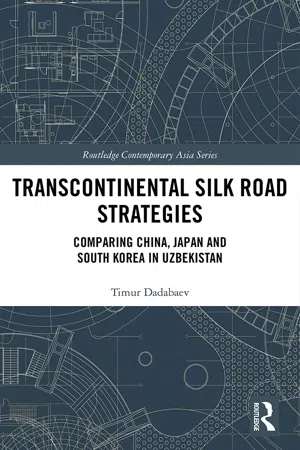
Transcontinental Silk Road Strategies
Comparing China, Japan and South Korea in Uzbekistan
- 172 pages
- English
- ePUB (mobile friendly)
- Available on iOS & Android
Transcontinental Silk Road Strategies
Comparing China, Japan and South Korea in Uzbekistan
About This Book
This book analyzes initiatives and concepts initiated by China, Japan and South Korea (the Republic of Korea) toward Central Asia to ascertain their impact on regionalism and regional cooperation in Central Asia.
Using the case study of Uzbekistan, the book focuses on the formation of the discourse of engagement with the region of Central Asia through the notion of the Silk Road narrative. The author puts forward the prospects for engagement and cooperation in the region by analyzing initiatives such as the Eurasian/Silk Road Diplomacy of Japan of 1997, the Shanghai Process by China, the Korean corporate offensive, and other so-called Silk Road initiatives such as One Belt One Road (OBOR) or the Belt and Road Initiative (BRI). The book argues that material factors and interests of these states are not the only motivations for engagement with Central Asia. The author suggests that cultural environment and identity act as additional behavioral incentives for the states' cooperation as these factors create a space for actors in global politics. The book deconstructs Chinese narratives and foreign policy toward smaller states and presents a more balanced account of Central Asian international relations by taking into account Japanese and South Korean approaches to Central Asia.
This book encourages wider theoretical discussions of Central Asian–specific forms of cooperation and relationships. It provides a timely analysis of Central Asian international relations and is a helpful reference for researchers and students in the fields of international relations, security studies, Asian politics, global politics, Central Asian Studies and Silk Road studies.
Frequently asked questions
Information
Table of contents
- Cover Page
- Half Title Page
- Series Page
- Title Page
- Copyright Page
- Table of Contents
- List of figures
- List of tables
- Acknowledgements
- 1 Discursive power of “Silk Road” in China, Japan and South Korea’s foreign policies toward Central Asia
- 2 Evolution of the “Silk Road” into a foreign policy discourse
- 3 Discourses of rivalry or rivalry of discourses?
- 4 Japanese and Chinese infrastructure development strategies in Central Asia
- 5 Chinese, Japanese and South Korean economic cooperation road maps for Uzbekistan
- 6 The Chinese economic “offensive” in post-Karimov Uzbekistan
- 7 Revisiting Japan’s Silk Road master-narratives
- 8 South Korea’s modernizing power in Uzbekistan
- Conclusions: the last Asian frontier?
- Index